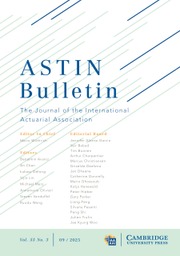Crossref Citations
This article has been cited by the following publications. This list is generated based on data provided by Crossref.
Diko, Peter
and
Usábel, Miguel
2011.
A numerical method for the expected penalty–reward function in a Markov-modulated jump–diffusion process.
Insurance: Mathematics and Economics,
Vol. 49,
Issue. 1,
p.
126.
Avram, Florin
and
Perez-Garmendia, Jose-Luis
2019.
A Review of First-Passage Theory for the Segerdahl-Tichy Risk Process and Open Problems.
Risks,
Vol. 7,
Issue. 4,
p.
117.
Jiang, Pingping
Li, Bo
and
Wang, Yongjin
2020.
Exit Times, Undershoots and Overshoots for Reflected CIR Process with Two-Sided Jumps.
Methodology and Computing in Applied Probability,
Vol. 22,
Issue. 2,
p.
693.


